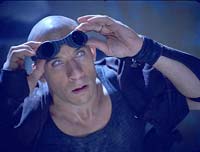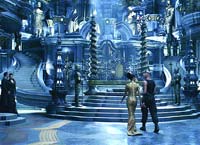Halfway through The Chronicles of Riddick, the title character (Vin Diesel) leads a ragtag group of convicts across the surface of the planet Crematoria where the daylight temperature is 700 degrees. (Get it? Crematoria!)
As they make their dash, sunrise hits (which seems to happen about every seven minutes on Crematoria). Sunlight rolls across the planet and nips at the group’s heels as they run. It’s an impressive sight. However, the suspense is deadened because, it turns out, the heroes can avoid the 700-degree heat by ducking in the shade. In fact, when a character is trapped in the sunlight on a cliffside, all Riddick has to do is swing down on a rope and pull her under a rocky outcropping. In the safety of the shade, the hero poses as smoke rises from his shirt. All you can think—besides sunscreen jokes—is: Wow, isn’t Riddick cool?

The race against the sun typifies this sci-fi actioner: it’s big, pretty to look at, and doesn’t make much sense. But it also proves the major selling point of both The Chronicles of Riddick and its predecessor, Pitch Black. When the original space thriller was released in 2000, the general consensus was: “Eh. Average action film, but wow, isn’t Riddick cool?” Obviously, writer and director David Twohy and producer Diesel thought the same thing. In this first of three planned sequels—especially in one key scene—you realize they want to turn Riddick into a Conan the Barbarian hero: epic and larger than life with grand mythos and a destiny.
As the movie begins, the murderous convict Riddick has been hiding from bounty hunters since surviving the events of Pitch Black. But the law isn’t the only group that wants him. He is also in demand because he could be the man prophesized to stop the deadly Necromongers.

Chronicles owes a tremendous debt to The Matrix. It includes prophecy, a chosen one, a reluctant anti-hero, and more. In fact, instead of an oracle, it has an “elemental” (which the movie explains doesn’t tell the future but just calculates the odds of it) and instead of a super-fast unbeatable Agent Smith, it has a super-fast unbeatable Lord Marshal. Most of the time, Chronicles feels like a film student’s attempt to make his own Matrix. The only differences come from things Twohy pulls from sci-fi staples like Star Wars, Dune, and Flash Gordon.
The $120-million budget makes the film stand above Pitch Black in special effects and landscapes. The action is constant but rarely ground-breaking. In fact, in one major battle, the action is so passive it feels like a music video. All in all, this is a slightly above-average action flick with a solid ending that alone makes another sequel—and what Riddick could do in it—intriguing.
But as Twohy and Diesel know, their bread and butter is Riddick himself. He really is the classic bigger-than-life hero you can’t take your eyes of off. But, in the lead role now, he does get old after a while. Even Vin Diesel can bark only so many badly written one-liners before it gets tiring.

But Riddick is intriguing not just because of his toughness and Schwarzenegger presence. He is also a study in reluctant anti-heroes. He’s a killer. But there’s also a caring side and a sense of mystery that draws you in. After two movies, it is still hard to peg down exactly what makes this guy tick. The movies tease you to think that Riddick may be guiltily wrestling with who he is. But is he? In the first film, he says he believes in God but hates him because of the tough life he’s had. And then, after learning a lesson in personal sacrifice, he tells a character that the old Riddick is now dead: “He died somewhere on that planet.”
But in the sequel, the character doesn’t go much deeper than that. It’s hard to tell which Riddick he is here, the old one who “died on that planet” or a new reformed one. There just isn’t much character development and no substantial discussion of Riddick’s beliefs or convictions.

Therefore, all of Chronicles‘ religious content pretty much belongs to the Necromongers. Opening narration describes them as a religion making a dark pilgrimage to their promised land. On their way, they destroy planets one-by-one to increase their numbers by conversion. In truth, the massive army seems to more resemble Star Wars’ evil Empire or Star Trek’s Borg than a religion. The Necromongers rule with fear and they seemingly brainwash their victims in a forced conversion.
Still, the movie does try to comment on religious free choice and the nature of evil. But, like the heat on Crematoria, little is fleshed out. But I suppose it really doesn’t matter because … wow, isn’t Riddick cool?
Talk About It
Discussion starters- Beginning narration says: “In normal times, evil should be fought by good but in times like these, it should be fought by another evil.” In what ways is this true in the universe of the movie? How is that applicable to our world?
- Do you think Riddick is really evil? Why or why not?
- What does the movie say about free choice of religion?
- In what ways are or aren’t the Necromongers a religion? Are they in any way comparable to anything in a Christian worldview? Who is the film’s most honestly religious character?
- What do you think happens after this film? What do you think Riddick—based on his character thus far—will now do?
The Family Corner
For parents to considerRated PG-13 for intense sequences of violent action and offensive language, the main concerns are with a lot of hand-to-hand combat resulting in plenty of stabbings, decapitations, and death. There’s also a bizarrely sexual scene where women under sheets writhe and moan while reading Riddick’s mind.
Photos © Copyright Universal
What Other Critics Are Saying
compiled by Jeffrey Overstreetfrom Film Forum, 06/17/04In 2000, a low-budget sci-fi adventure film called Pitch Black delivered enough enthusiasm and creativity to win a crowd of fans, largely due to one of its central characters. We were introduced to Riddick (Vin Diesel), a murderer in shackles who is freed when his spaceship crashes. His talent for killing comes in handy when he and the other stranded survivors are forced to contend with a deadly race of aliens that only come out during a rare solar eclipse. The character made enough of an impression that his creator, David Twohy (Below), decided to expand his story in a big-budget trilogy.
And so we now have The Chronicles of Riddick. You would think that a bigger budget, a cast that includes Dame Judi Dench (Iris, Shakespeare in Love), and a heavily publicized video game tie-in would get things off to a good start.
You would think so …
“Perhaps they should have called it The Chronicles of Riddick-ulous,” writes Michael Elliott (Movie Parables). “The story and dialogue is beyond laughable. How else should we receive lines such as ‘It’s been a long time since I smelled beautiful’ if not with incredulity? The names given to places and people would be more fitting in a Mad Magazine spoof of the film than in the film itself.”
Gerri Pare (Catholic News Service) says, “It’s not the kind of sequel where you need to have seen the first to comprehend the second; it’s just that the better choice is to see the first and maybe skip the second. For all its density of plot and frequent shootouts … Twohy’s script lags, with the necessary sense of urgency distinctly lacking. The characters … are left underdeveloped and end up being dull.”
Tom Neven (Plugged In) says it’s “a richly imagined world; the set and costume designs make for great eye candy, something like The Lord of the Rings meets The Matrix meets the recent remake of Planet of the Apes. Otherwise, the movie is confused. Some of that comes from unnecessary distractions in the story line. But most of it comes from the moral elements within it. I suspect many families won’t be willing to expose their teens … to the moral ambiguity, dicey language, and violence it contains.”
Todd Hertz (Christianity Today Movies) says, “Most of the time, Chronicles feels like a film student’s attempt to make his own Matrix. The action is constant but rarely groundbreaking. In fact, in one major battle, the action is so passive it feels like a music video. All in all, this is a slightly above-average action flick with a solid ending that alone makes another sequel—and what Riddick could do in it—intriguing.”
Mainstream critics are cataloguing the film’s flaws here.
Copyright © 2004 Christianity Today. Click for reprint information.












